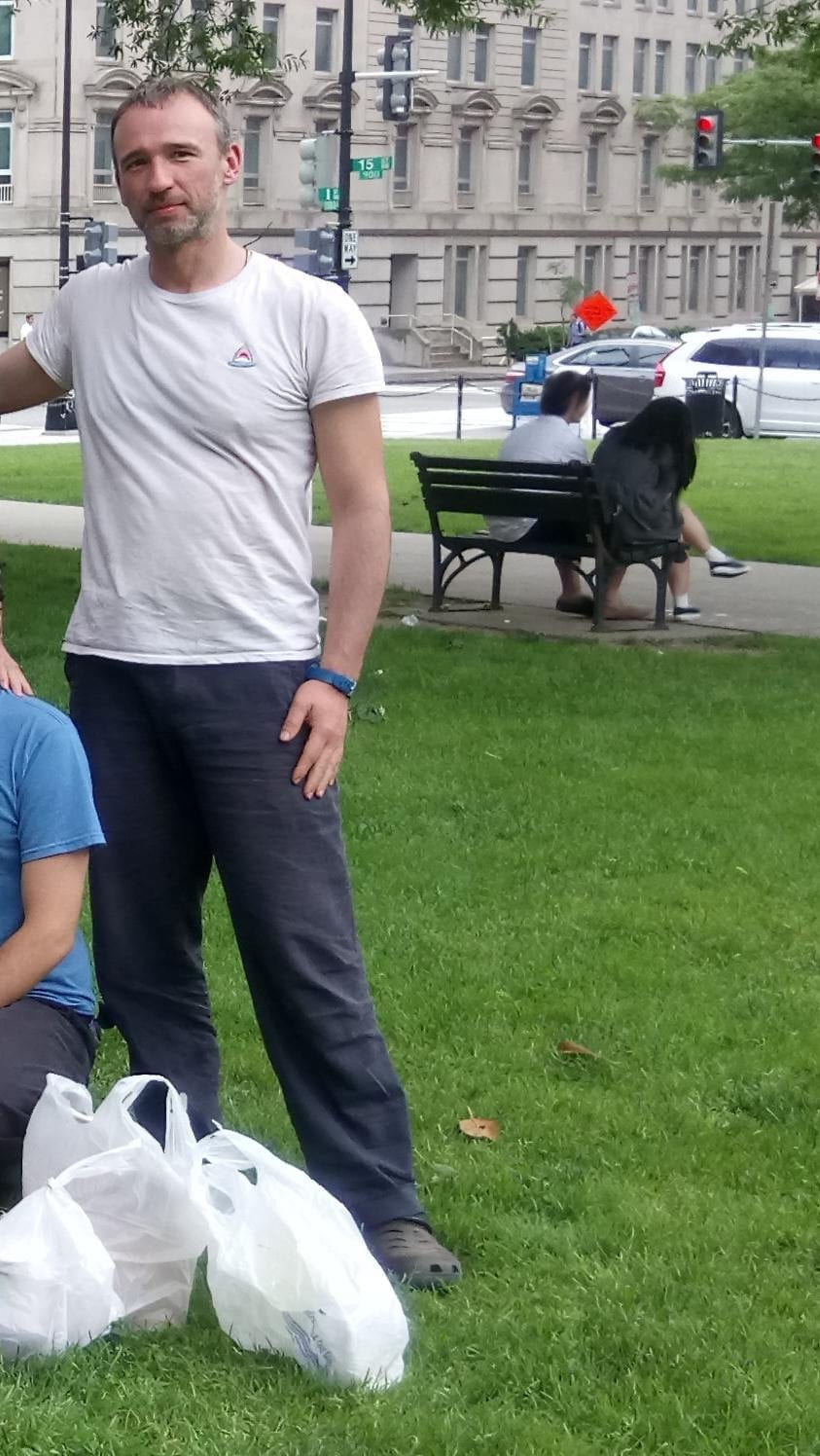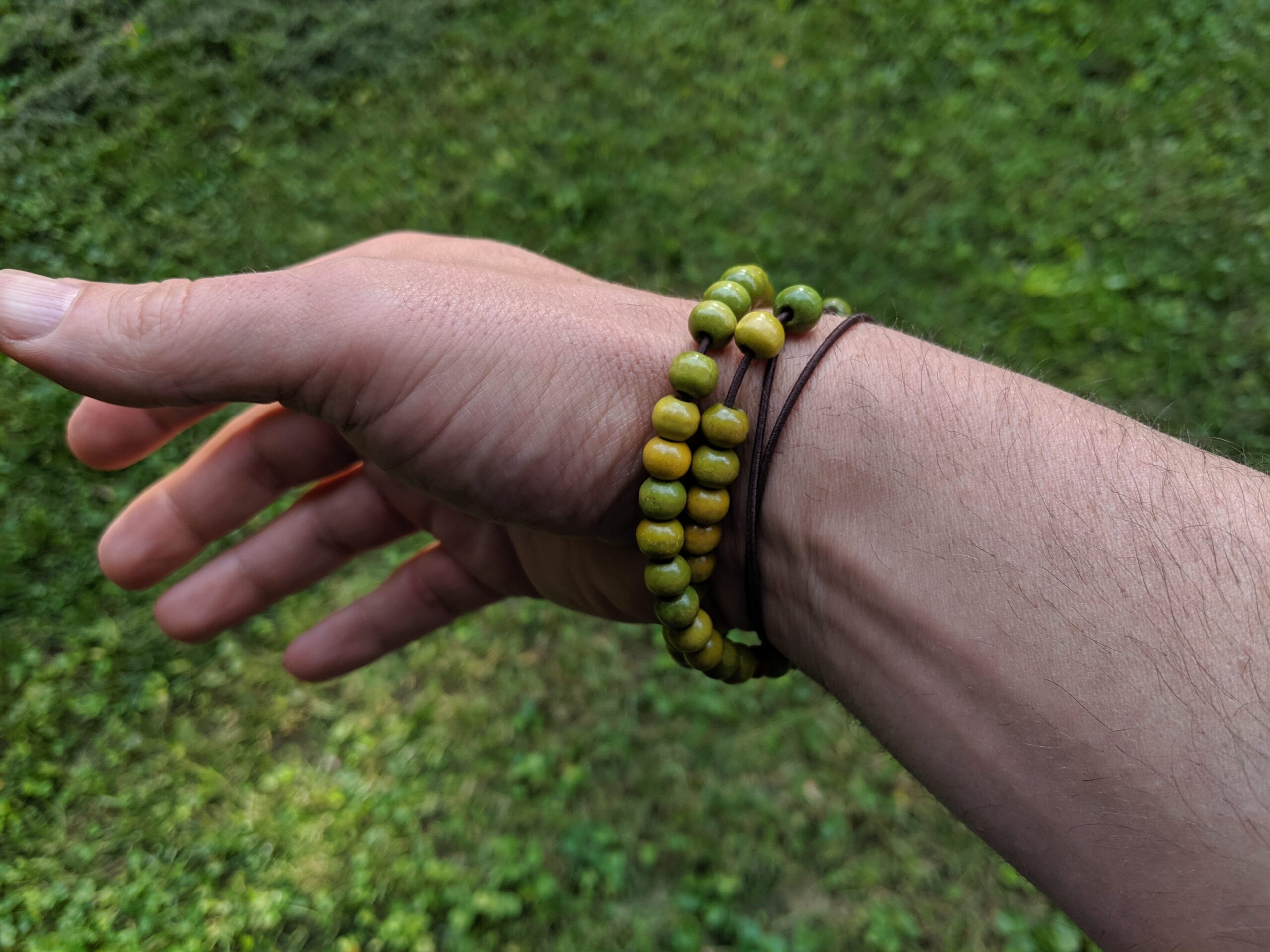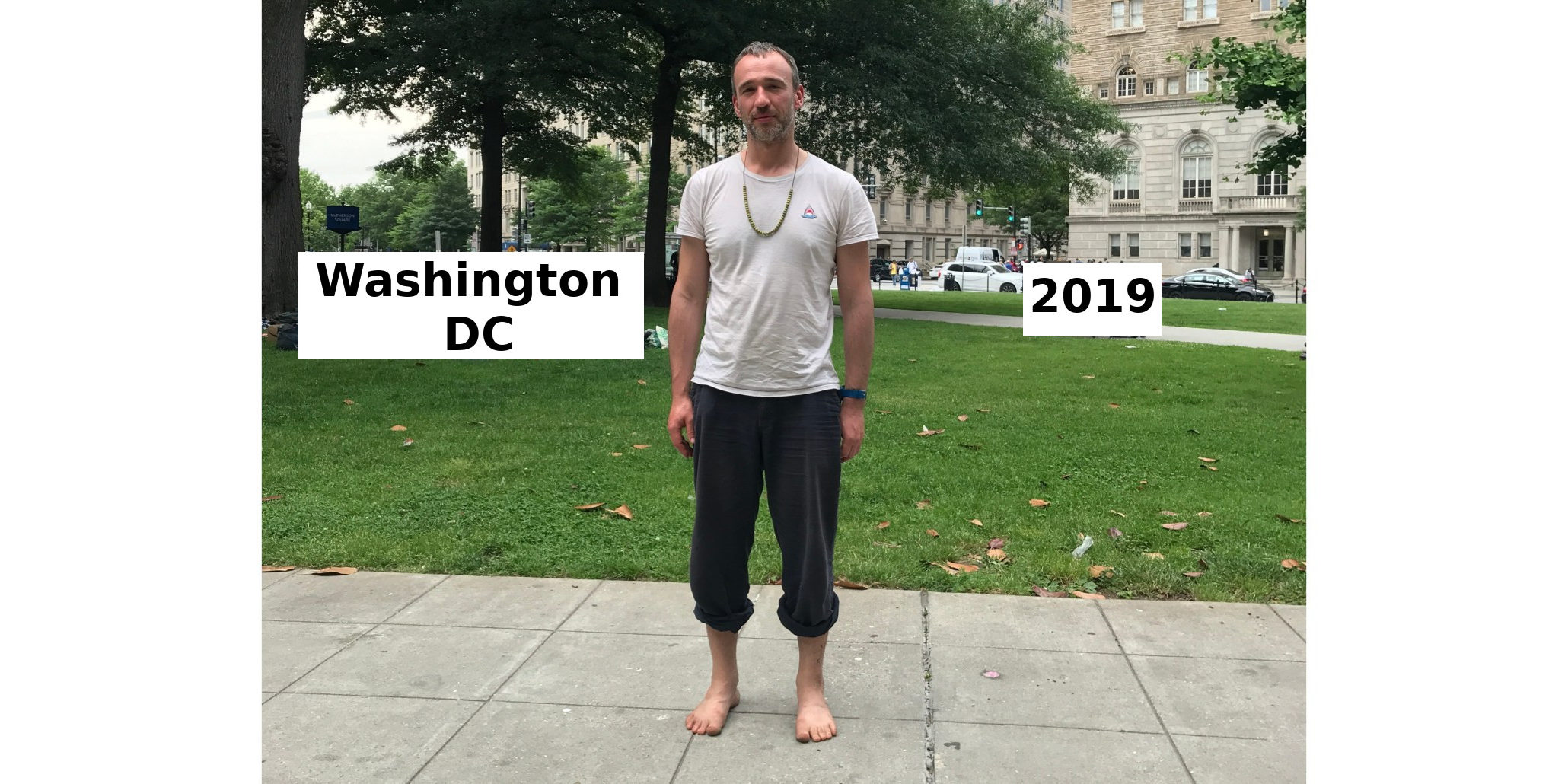For 5 days, we lived together with homeless people on the streets of Washington DC. We slept 3 minutes from The White House in the area inhabited by the richest Americans. We had no wallets and no cell phones. We ate at soup kitchens, hung out in parks, begged and mainly talked to people we met.
Everything began 25 year ago in DC when Roshi Bernie Glassman sat on the street for the first time. Since then, many street retreats were held in many cities. The main intention of this unusual Zen practice was being the bearing witness of the street life. Our group of 13 people wandered around without any clear objective. We were not there to teach anyone or help in any material way. The only thing we were offering were our time and attention. However, we also received a lot.
Shakyamuni Buddha’s lifestyle
There was something exciting in the idea of practicing in a similar way as it was common in Shyakiamuni Buddha’s times. He and his followers owned only a robe and a begging bowl. They wander from place to place, begged for food, practiced and discussed Dharma. Residential practice in monasteries came later. It allowed for greater isolation and to control better practice conditions but required self-sustainability i.e. owning and maintaining things. I was excited that I could try out this ancient lifestyle and the practice method.
Space
From the sidewalk, the city looked completely different. When we did not have to rush to your appointments or commitment, a space opened and I could see the street more clearly. We tried not to be too busy. We sat zazen, avoided unnecessary conversations and shared what was important for us during our councils. Thanks to this process, I was able more to become one with the street with all people on it and everything that was happening there. I wasn’t a regular street user anymore.
Freedom
Surprisingly, after a few days, I realized that I actually liked this style of life. Sleeping on cardboards wasn’t so uncomfortable. Finding something to eat was relatively easy. I didn’t possess much so I had only a few things to take care for. I didn’t have any responsibilities. I felt an extreme freedom which I hadn’t felt for a long time. The last time was 20 years ago when I hitched hiked around Poland and Europe. There were so few things that limited us on the street. It became so visible how much everyday responsibilities, planning and maintaining of belongings take energy.
I’m sure that after a while a limited access to a shower and weather conditions could be annoying. However, it became clear for me that I’d like to investigate this freedom deeper. It does not mean I promote living without responsibilities. It’s more about exploring these mind frames we or society create for ourselves. Originally they are meant to organize things and to make them more efficient but with time we see these mind frames as reality and we lose the appropriate distance.

Parallel dimensions
Parallel dimensions of the city were the first thing that emerged. Each dimension was populated by different type of citizens:
- Homeless;
- Suits – middle class office workers;
- Officers – the police, firefighters, road workers, soup kitchen staff, etc;
- Tourist;
- Politicians;
- We – participants of the street retreat.
I was shocked how much these dimensions were isolated from each other. I had a similar impression when meditating and watching animals in a forest in the past. Animals usually had no interest to interact with representatives of other species but they were more lively interested in their own kind. When anyone from one dimension tried to interact with a person from another dimension, it caused some kind of unusual state and anxiety. There was a feeling of relief when the interaction ended and everyone went back to its own dimension.
Homeless
I was prepared to see and take a lot of suffering when departed on the street. It surprised me that life of homeless can also be pleasant. I met many nice people who I had a very sincere and pleasant conversation with. I was surprised how much time and mental space they had for me. Homeless also surprised us with their generosity. They shared their food with us. We also received money from them although we didn’t ask.
Homeless were definitely the most present people on the street. Although many of them suffered from drug abuse and mental illness. They gathered together and spent time, observed passing by pedestrians and exchanged information. They have a lot of free time.
Their life can be hard. Many of them freeze in the winter. They do not receive good medical care. When they get older their bodies limits them. They try to deal with their problems in a similar way as other people do and sometimes they can be very creative. For example, there were many rats in the place where we slept. We get an advice to put some food for them a couple feet further in order they do not bother us during the night.
Homelessness is also a bigger problem then the average person can see. During one of my conversations, I heard that there are about 5000 homeless in the area near the White House. They are not always so obvious. Some of them sleep in cars. Some of them even have jobs. Our neighbor, who slept next to us, had a daytime job. He also had a place to live and family in another state. Living on the street in DC was only a temporary choice for him to earn some money and go back. He just didn’t want to pay high DC rent.
Homeless are always afraid that someone can steal their belongings so they carry big bags with them. You can not go for a work interview like this but there are not many safe places to leave your things. Many homeless lost also their documents and the process of obtaining replacements takes months. They have a feeling that the system does not do enough for them. For me, it looks like we rather tend to find ways to isolate from them then actually integrate.
In fact, they are very interesting people. I heard a lot of amazing life stories and met many talented people. I also have not met anyone who liked living on the street. They very often reviled that they wanted to get out, find a job and a place to live. Many also accepted that their situation wouldn’t change.
Suits
I haven’t seen in any other city so many fancy-looking people. They wore expensive suits and dresses. Their bodies looked fit. Although, they looked beautiful and it was nice to watch they were completely unpresent. Their ears were clogged with ear plugs connected to smartphones. The street was for them only a device to get from one place to another. More life was in interaction between them and their cellphones than other people around.
I called them suits because for me they looked like avatars floating a few inches above the ground. It seemed like their self identification was based on how they presented themselves to others. They were all perfect like always ready to pose to a picture. They were dressed not only in suits but also gestures or well-built bodies. I had the impression that this armor was empty inside but in fact, I could not even see what was inside.
When signing up for the retreat, I was expecting that suffering of homeless people will be the overwhelming main theme and I’d be able to appreciate more comfort and condition of so-called “normal” people’s life. I was surprised that it is completely opposite. People in suits definitely looked for me more alienated and suffering. I had more compassion towards them then other people. My attitude was probably unusual. Our group consisted of many social workers and their sensitivity was more directed toward homeless. We sometimes discussed what can be done for them. I felt that I’m ready to do more for these employees of corporations because I felt that they need it more and the scope of karmic consequences will be wider. I tried to find some ways to interact with them more during the retreat. It was challenging. Homeless were much easier to interact.
 Officers, Tourists, Politicians and We
Officers, Tourists, Politicians and We
Another dimension is populated by officers. They are people who have some kind of function they are responsible for e.g. the Police is responsible for safety. They interact with other dimensions but you can feel that it is more a “procedure” than a human-to-human relation.
Tourist came to DC to do sightseeing. They are busy with their cameras to collect some souvenirs and excitement. They came in groups and mainly interact within themselves.
Very often our conversations were interrupted by helicopters flying over our heads. Maybe Donald Trump was coming back home? Maybe other politicians were flying to attend a very important meetings? There were so many so important decisions made so close to us. We couldn’t see people who made them but we knew that they are somewhere there.
We were a little bit like anthropologist who landed on a remote island to get to know and understand society that lives there. Moreover, we decided not only to observe but also live like homeless people do to experience their everyday joys and worries.
Asking, Giving and Receiving
During Zen training, Giver and Receiver is a frequent concept because it is so common. Normal healthy groups and societies exchange things all the time. The practice is to just give when somebody needs without any additional expectations nor attachments and just receive without any guilt nor feeling that I have to pay back. Anything that is added to giving and receiving is something extra and it is a cause of suffering. So, in theory, asking for something when you need it should be as easy and straightforward as saying “How are you?”.
I was surprised by the generosity of homeless people but I really wanted to reach out to “suits” and interact with them more to better understand them. Maybe, I wanted to check if there is anyone inside? Since begging was encouraged by the organizers of the retreat, I decided to try this way.
Yoga on sidewalk
I decided to do yoga on a sidewalk. I put a hat in front of me and my friend was inviting passing-by people to give some spare change. After an hour, we collected only $1. People completely didn’t want to interact and avoided a visual contact with us. It is something I could actually understand. Two healthy men, who could go to work, were asking them for money. They could be irritated. They may have been also afraid that we wanted to buy alcohol or drugs.
BTW I did my Ashtanga yoga training on a concrete sidewalk without any mat in the same clothes I wore all 5 days and it was a very good training. You really do not need much to do this practice. Quiet air-conditioned rooms, yoga classes, special mats, props or special outfit are helpful but not necessary. You need only a few square feet of surface.
Hot tea
I decided to try something easier. I really wanted to have a cup of hot tea but I didn’t have any money. (The collected dollar went to our community treasury and will be distributed to charity later.) So, I stood in front of a coffee shop and asked people if can buy me a hot tea. The biggest difficulty was to catch a visual contact. Most of pedestrians just had headphones in their ears and were completely indifferent to anything around. They seemed to be fully submerged in their thoughts.
People, who I was able to ask, reacted exactly in the same way as those asked for money. They completely didn’t want to have any interaction with me. When asked, they felt very uncomfortable. It wasn’t neither anger nor disgust. They seemed to be in some state of a momentary panic. After 30 minutes, I gave up. I felt very sorry for them. It was OK that they didn’t want to buy me a cup of tea. They could have had their own reasons. I was rather worried that something so natural as asking put them out of balance and they didn’t know what to do with it.
Photos
I thought that maybe my asking was a little out of blue for them. It might have been unusual that somebody asks for money or tea. So I began asking if the person can take me a picture with their phone and email it to me.
Some people agreed, some didn’t. I often explained that I did not have my phone on me, right then so it found more understanding. It seemed to be more a problem from their world. Maybe thanks to that I gained more sympathy because looked less different and I could be considered the same “species”?
However, one young man is still remaining in my memory. He was about 25-30 years old. His shirt and suite were good quality and had bright joyful colors. He had fashionable well maintained beard and despite of the suite, he looked casual. We stopped together on lights at a crosswalk. He was walking and typing something on his cell phone. I asked him if he can take me a picture and email it to me. He looked confused for a moment and answered that he could not because his phone battery was running out.
Rationally, I knew that he might have needed his phone for something very important but deeply, I was sad because I felt that it was so difficult to give so little. Sometimes, our cell phones are for us like oxygen containers for astronauts. We panic that we can run out of something as vital as air to live.
Mala
Begging begun few weeks before the retreat. We were given a task to raise at least $500 from at least 5 different sponsors. Each donor was represented as a bead on malas which were worn all the time during the retreat. This way our supporters attended our retreat together with us.
It was not easy to ask for money. I had never been in a situation like this before. I tried practicing “just asking” without any additional thinking. I got surprised by generosity and kindness. Nobody was mean to me. Many people sent their regards for us for that we were doing. The response exceeded my expectations. 48 people raised together $1048 in order I could attend the retreat. I was touched by friends who I know that they used to have financial difficulties, contributed significant amounts.

The Conclusion
The main observation after the retreat is that we are isolated from each other as a society. We live in so many virtual bubbles chasing some virtual rewards and privileges. Maybe we believe that when we achieve a success we will get other peoples attention and love? It was so visible that sharing time with other people and exchanging with them was much more satisfying then consuming modern goods and interacting with devices in our hands. I’m sure that the world would have less problems if we were more open to each other. Many problems could be noticed and solutions would be relatively easily agreed. Moreover, we would find more space for everyday joy and our lives would have more meaning.
The Street Retreat in Washington DC, May 22-26
If you find any mistakes, please, help me to improve my English. You can suggest corrections here.


 Officers, Tourists, Politicians and We
Officers, Tourists, Politicians and We




Meghan joined our Street Retreat in Washington DC and wondered with us all 5 days. She had been leaving on the street for a few months. I’ve just received a message that her body was found. She was 27. We practiced yoga together…
https://www.gofundme.com/f/help-meghan-godfrey-return-home-to-australia